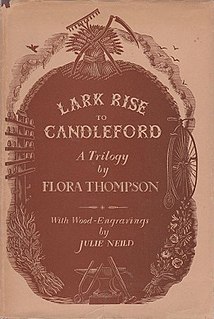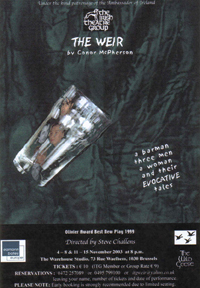Related Research Articles

Dame Edith Margaret Emily Ashcroft, known professionally as Peggy Ashcroft, was an English actress whose career spanned more than 60 years.

The Bread-Winner (1930) is William Somerset Maugham's third-last play. It is a comedy in one continuous act, lasting about 2 hours, but with the curtain lowered twice to rest the audience.
Gladys Bronwyn Stern or GB Stern, born Gladys Bertha Stern in London, England, wrote many novels, short stories, plays, memoirs, biographies and literary criticism. The National Portrait Gallery, London holds four portraits of her.

Rodney Ackland was an English playwright, actor, theatre director and screenwriter.

Lark Rise to Candleford is a trilogy of semi-autobiographical novels by Flora Thompson about the countryside of north-east Oxfordshire and Buckinghamshire, England, at the end of the 19th century. The stories were previously published separately as Lark Rise in 1939, Over to Candleford in 1941 and Candleford Green in 1943. They were first published together in 1945.
Clare Margaret Holman is an English actress. She portrayed forensic pathologist Dr. Laura Hobson in the crime drama series Inspector Morse and its spin-off Lewis from 1995 to 2015.
The Orange Tree Theatre is a 180-seat theatre at 1 Clarence Street, Richmond in south-west London, which was built specifically as a theatre in the round. It is housed within a disused 1867 primary school, built in Victorian Gothic style.

The Weir is a play written by Conor McPherson in 1997. It was first produced at The Royal Court Theatre Upstairs in London, England, on 4 July 1997. It opened on Broadway at the Walter Kerr Theatre on 1 April 1999. As well as several other locations in the UK and the U.S., the play has been performed in Ireland, Germany, the Czech Republic, Slovenia, Australia and Canada.

The Letter is a 1927 play by W. Somerset Maugham, dramatised from a short story that first appeared in his 1926 collection The Casuarina Tree. The story was inspired by the real-life Ethel Proudlock case which involved the wife of the headmaster of Victoria Institution in Kuala Lumpur who was convicted in a murder trial after shooting dead a male friend in April 1911. She was eventually pardoned.

Christopher Thomas Morahan CBE was a British stage and television director and production executive.
Chains is a play by the English playwright Elizabeth Baker. It was first performed in April 1909 by the Play Actors Subscription Society at the Court Theatre.

Auriol Smith is an English actress and theatre director. She was a founder member and associate director of the Orange Tree Theatre in Richmond, London. She co-founded the theatre in 1971 with her husband Sam Walters, who became the United Kingdom's longest-serving artistic director. Walters and Smith stepped down from their posts at the Orange Tree Theatre in June 2014.
Elizabeth Baker was an English playwright whose plays explored class, gender and the domestic and professional lives of the lower middle classes.

Sam Walters MBE is a British theatre director who retired in 2014 as artistic director of the Orange Tree Theatre in Richmond, London. He has also directed in the West End and at Ipswich, Canterbury and Greenwich, as well as at LAMDA, RADA and Webber Douglas. After 42 years Walters, the United Kingdom's longest-serving artistic director, and his wife and associate director, Auriol Smith, stepped down from their posts at the Orange Tree Theatre in June 2014.

Christopher Ravenscroft is an English actor, best known for his recurring role as DI Mike Burden in The Ruth Rendell Mysteries, the ITV adaptation of Ruth Rendell's Inspector Wexford mysteries.

Michelle Fairley is an actress from Northern Ireland. She is best known for playing Catelyn Stark in the HBO series Game of Thrones (2011–2013). She has since appeared in the USA Network series Suits (2013), the Fox series 24: Live Another Day (2014), the science fiction series The Feed (2019), and the Sky Atlantic crime drama Gangs of London (2020–).
Julia Watson is a British actress known for playing Barbara 'Baz' Wilder in the BBC medical drama Casualty in 1986, 1995–98 and again from 2003 to 2004.

Lily Chloe Ninette Thomson, better known by her stage name Lily James, is an English actress. She studied acting at the Guildhall School of Music and Drama in London and began her career in the British television series Just William (2010). Following her role in the period drama series Downton Abbey (2012–2015), her film breakthrough was the title role in Cinderella (2015).
The Stepmother is a 1924 play by the British playwright Githa Sowerby. It tackles the tensions of female independence in a patriarchal society. The play was first staged for a single performance in January 1924 at the New Theatre in London's West End. It starred Campbell Gullen as Eustace Gaydon and Jean Cadell as Lois Relph.

Pomona is a play by Alistair McDowall that was commissioned for The Royal Welsh College of Music & Drama in 2014 and performed at The Gate Theatre in London as part of the NEW festival of plays. It then went on to the Orange Tree Theatre in Richmond, South West London, in November 2014.
References
- 1 2 Billington, Michael (18 March 2013). "The Man Who Pays the Piper – review: Orange Tree, Richmond". The Guardian . London. Retrieved 4 April 2013.
- 1 2 3 4 Thompson, Laura (19 March 2013). "The Man Who Pays the Piper, Orange Tree Theatre, Richmond, review". The Telegraph . London. Retrieved 4 April 2013.
- 1 2 3 4 5 6 7 Gale, Maggie (1995). "Women Playwrights on the London Stage: 1918–1968". In Woodrough, Elizabeth (ed.). Women in European theatre. Oxford: Intellect Books. pp. 75–84. ISBN 1871516862. OCLC 34173681.
- 1 2 3 Taylor, Paul (18 March 2013). "The Man Who Pays The Piper, Orange Tree, Richmond" . The Independent . Archived from the original on 18 June 2022. Retrieved 9 May 2018.
- 1 2 Rank, Julia (13 April 2013). "The Man Who Pays the Piper – Exeunt Magazine". exeuntmagazine.com. Retrieved 10 May 2018.
- 1 2 3 Morgan, Charles (1 March 1931). "G.B. Stern Again Invades the Theatre". The New York Times. p. 2X (Section 8, page 2). ISSN 0362-4331 . Retrieved 8 May 2018.
- ↑ Marlowe, Sam (9 April 2013). "The man who pays the piper". Theatre Record. Vol. 33, no. 6. pp. 259–260.
- 1 2 3 "St. Martin's Theatre". The Times . London. 11 February 1931. p. 10.
- ↑ "The Man Who Pays the Piper". Orange Tree Theatre. 2013. Retrieved 4 April 2013.
- ↑ Billington, Michael (24 April 2013). "The Breadwinner – review". The Guardian . Retrieved 9 May 2018.
- ↑ Stern, G. B (1931). The man who pays the piper, a play in a prologue and three acts,. Boston, Mass.; Los Angeles, Calif.: Baker International Play Bureau.